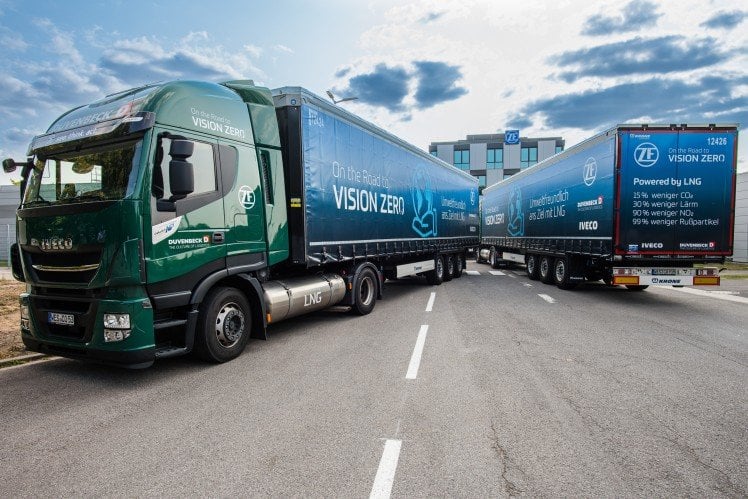ZF Logistics Partners with Iveco Trucks for an Eco-friendly Natural Gas Drive
ZF and long-standing commercial vehicle customer Iveco have joined forces to help achieve greater climate protection with significantly lower emissions.

- ZF and long-standing customer Iveco work together for greater climate protection and lower emissions
- Transport powered by liquid or compressed natural gas significantly reduces carbon dioxide, nitrogen oxide and exhaust particle emissions – and noise
- From 20 to 200 by 2025: ZF’s gas-powered logistics fleet is expected to increase tenfold
Together, they enable freight forwarders operating on behalf of ZF to use cost-efficient natural gas-powered freight trucks.
Today’s long-distance trucks are mostly diesel-fuelled – due, in the main, to the more costly and limited availability of most alternative drivetrains and respective infrastructures. The exception is gas. However, diesel and gas drive systems differ much more in terms of emissions than in terms of cost. Gas-powered truck engines produce 15 percent less carbon dioxide, 90 percent less nitrogen dioxide, and 99 percent fewer exhaust particles. Trucks powered by liquid (LNG) or compressed natural gas (CNG) also produce around 30 percent less noise – an additional benefit for people living near roads.
For ZF and its long-standing customer Iveco, the commercial vehicle subsidiary of CNH Industrial Group, these are reasons enough to join forces on the road to greater environmental and climate protection. At the end of 2018, the natural gas truck project was initiated at the board level of both partners. In 2019, Spedition Lakner began serving routes between the ZF plants in Friedrichshafen and the ZF casting plant in Nuremberg, using three LNG trucks. This summer, logistics service provider, DB Schenker, began using LNG vehicles on the heavily used ZF Schweinfurt–Saarbrücken route. During this time, ZF has also been operating 20 Iveco gas trucks – with this number expected to double by the end of this year.
“Making road traffic emission-free is a key objective of our ‘Next Generation Mobility’ strategy,” says Wilhelm Rehm, Member of the ZF Board of Management responsible for Materials Management, Commercial Vehicle Technology, and Industrial Technology. “We want to contribute to this with our technologies as well as in our own production and supply chain. The use of natural gas-powered trucks is a ZF contribution to climate protection.”
ZF has set itself the goal of becoming climate-neutral by 2040 – ten years earlier than current EU regulations stipulate. To support this goal, ZF is addressing all three scopes of the greenhouse gas protocol: Scopes 1 and 2 relating to emissions from in-house production and the purchase of power; and Scope 3 relating to the environmental impact of products and emissions from the entire value chain.
The ZF and Iveco partnership model is being extended. In recent months logistics company Duvenbeck has taken over the local transport between ZF locations in Saarland, with the use of eleven Iveco trucks equipped with a 460 HP LNG engine and the ZF TraXon transmission system. Sustainable logistics based on the use of natural gas has been supported by other partners: Berlin-based start-up, Liquind, opened a mobile LNG filling station in Sankt Ingbert, Saarland, in May 2020, thus ensuring a local fuel supply. And since the beginning of October, Zureck Logistik GmbH has been operating a CNG truck as part of its fleet at the ZF site in Brandenburg an der Havel.
ZF’s natural gas-based logistics could soon become an export model. With a great deal of interest around this technology, ZF and Iveco are currently in discussion with several other forwarding companies. Freight forwarders in other EU countries have expressed interest in using this sustainable drive system to support other ZF locations in Europe. ZF is optimistic it will reach its self-imposed target of 200 gas-powered trucks serving local and long-distance logistics between its plants by 2025 – a tenfold increase over the next five years.
www.zf.com

